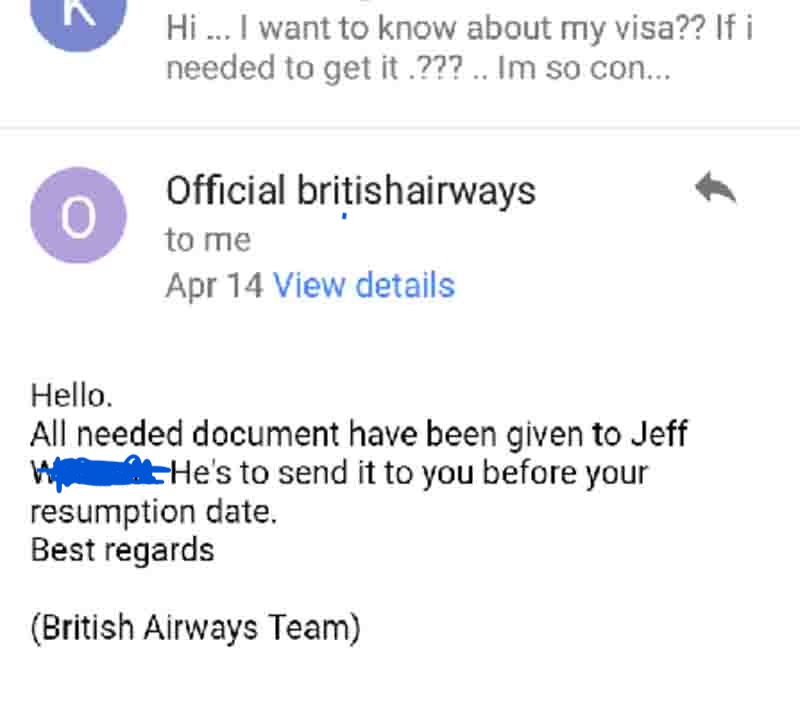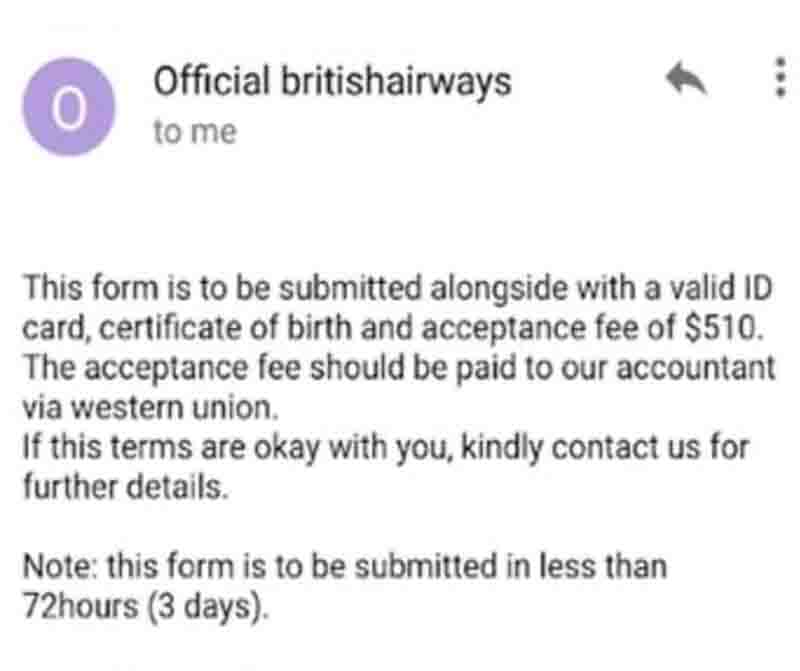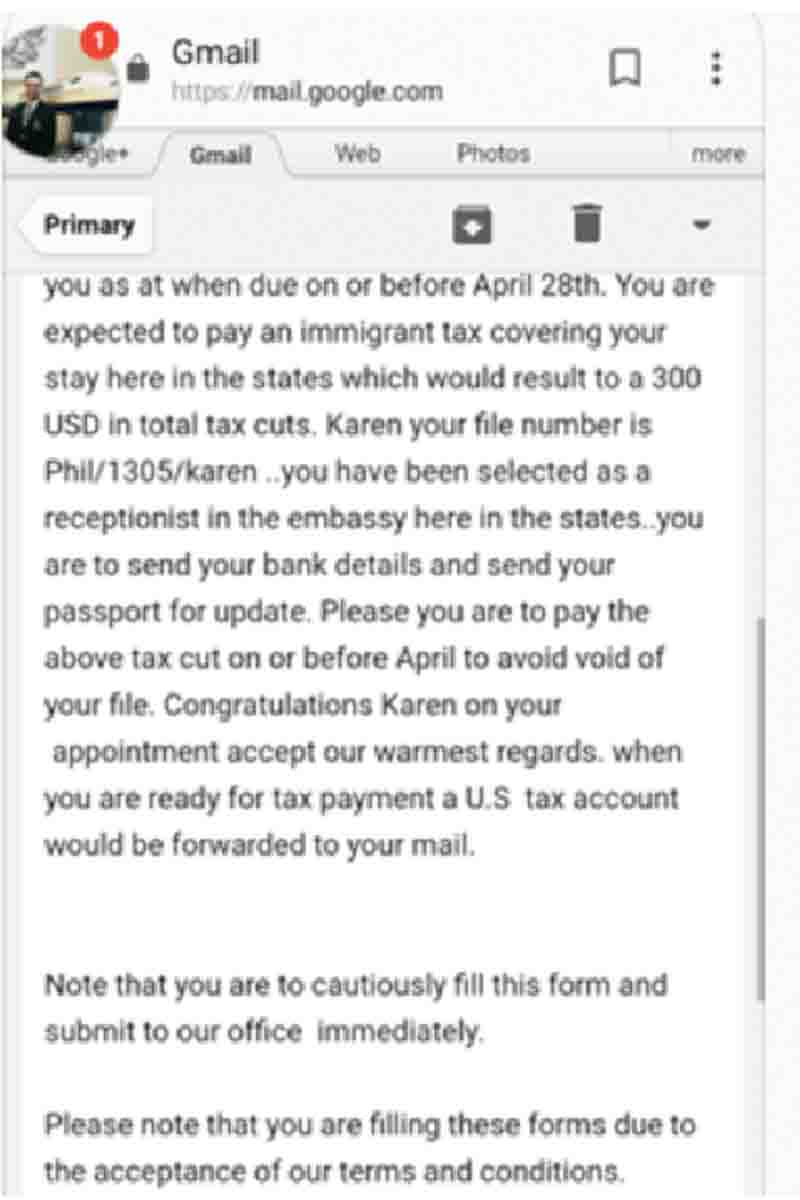As she searched for a new job, love suddenly was in the air — or so Karen C. thought. But behind the inappropriate emails she received from her recruiter with carefully typed romantic promises lurked a scammer weaving a web of deceit.
Karen couldn’t believe her luck. She thought she had found a dream job and a romantic partner, but the reality was much different.
Internet scammers are laying traps everywhere, including on reputable sites like LinkedIn and Medium, preying on job seekers’ desperation and lonely people looking to make a connection.
Unfortunately, Karen checked both of those boxes.
This cautionary tale is not about falling in love; it’s about falling into the abyss of an internet romance scam.
Here’s her story.

Failing to see the warning signs of an internet romance scam
Karen hoped to leave her home in the Philippines to start a new life abroad. So when a handsome British Airways recruiter, Jeff W., contacted her through Instagram, she was thrilled.
Jeff told Karen that he had a fabulous job opportunity for her at British Airways. According to him, BA was looking for new employees and would pay all expenses to fly her to the United Kingdom. She would be perfect for the position. And when Jeff’s emails and texts became flirtatious, she didn’t discourage him.
Karen began making plans to quit her current job and move to England.
But then Jeff gave her some unexpected news that should have set off alarm bells for Karen.
As I pointed out in my article about job scams, no one should ever have to pay to apply for a job or lay out any cash. If a potential “employer” asks you for money, that’s a warning sign that you’re likely the target of a scam.
However, Jeff told Karen that to process her application, she would need to send him at least $200. When Karen explained she didn’t have that type of money, her enthusiastic recruiter suggested that she borrow it so she wouldn’t miss out on the opportunity.
Eventually, Jeff persuaded Karen to borrow a smaller amount from a friend. He then gave her wire transfer instructions.

Instant success: Scammers love wire transfers and Zelle
Instant money transfer systems like wire transfers and Zelle are fabulous ways for internet scam artists to receive money from their victims. These systems allow both sides to remain almost entirely anonymous. And once the money is sent, there is no way to reverse the transaction.
Unfortunately, nearly every day, I receive a plea for help from someone who has lost money through an internet scam. In virtually every case, the victim paid via Zelle, gift cards, or a wire transfer. (Note: Zelle has become a much more common vehicle for scammers to collect payments in 2025.)
Take, for instance, the case of Michele Turner, who was drawn in by the Mystery Shopper scam. She lost thousands of dollars after depositing a bogus check into her bank account as an “assignment” for her new job. Then, following the instructions given to her by her new “employer,” she sent a wire transfer to an unknown entity. There never was a job — it was all an elaborate internet scam — and she learned a costly lesson.
Karen wasn’t familiar with the dangers of making a wire transfer and missed more red flags. Jeff told her to send the “processing fee” to a stranger in Montana — for a job with British Airways in the United Kingdom.
When she asked Jeff when she would receive confirmation from British Airways, she soon received this text from “Official britishairways.”:

Now, Jeff turned up the pressure on Karen. He told her that to get the British visa, she would need to send an additional $300 immediately, or the job wouldn’t happen.

Karen was afraid of losing this opportunity. She had already told all her friends of her good fortune. And so she chose to believe that Jeff had her best interests at heart. She borrowed more money and sent it to the fake accountant of the fake British Airways — in the United States.

A final insult from this romance scammer
At this point, Karen was becoming suspicious of Jeff. His texts had become less frequent and less friendly and he was unable to give her a specific date for her departure from the Philippines.
Then she received an email from the “Ceo” of “Official britishairways” asking her for passport photos. That text was followed by a strange text that she had suddenly been approved for a job at the “embassy” in the United States. That was a job for which she hadn’t even applied. That message included a request for money and her own bank details.

Finally, Jeff told Karen to complete the last step in her application: she needed to buy 12 iTunes cards. Confused and hopeful that this was the final hurdle to jump for this job, she bought the cards. She scratched the privacy codes off the back and sent a photo of them to Jeff.
Related: This is how a Craigslist thief easily stole this guy’s Target gift cards
Can anyone help this internet scam victim?
We field a lot of requests for help from scam victims here at Consumer Rescue. Unfortunately, most can’t be helped because scammers — not surprisingly — don’t want to negotiate with consumer advocates. These predators often disappear without a trace after extracting as much money as they can from their victims.
Related: A Zelle pet scam cost this victim $4,000. Could you fall for it?
And that’s what happened in Karen’s case as well.
Soon after she sent the photo of the backs of all the iTunes cards, she discovered that Jeff had disappeared from Instagram. She was no longer able to reach him through email either. He was gone. “Official britishairways” stopped responding to her as well.
The awful truth started to become apparent. She wasn’t going to England for a new job or a new relationship. And she turned all of her anger on “Jeff ” who she still believed to be a real person working for British Airways.
That’s when she reached out to our advocacy team for help.
When Karen sent me her massive paper trail, it was immediately apparent that she had fallen victim to an internet romance scam. However, she wanted me to contact British Airways, report Jeff and get her money back.
“Can you find out if that Jeff ***** is truly working at British Airways,” she asked. “Please help me. Please. I have no one can else to contact. Maybe he has many victims too — not only me. I just want justice for this.”
Asking the Official British Airways team
Although I knew I couldn’t get justice for Karen, I did contact British Airways to discuss this case. Obviously, there is nothing official about “Jeff ” or the “Official britishairways,” but Karen is right, there are probably other victims of this internet scam.
I contacted the security team at British Airways on Karen’s behalf. The director confirmed that Jeff **** is not a British Airways employee and the airline does not charge to apply for a job.
This does appear to be an internet scam. We do not charge any sort of application fee for a candidate to apply for a role with us. Under the circumstances, I would advise Karen’s report this matter to the police. I would be happy to discuss this further with her directly.
(British Airways executive team)
Karen has learned a harsh lesson — financially and emotionally. The World Wide Web is filled with good and evil. Unfortunately, right now, an army of scammers are currently searching the internet for new victims. So it’s vital to remain vigilant and always regard uninvited contact with scrutiny. I’m sorry we can’t help in this case, but I hope Karen’s story can help others avoid the same fate. (Michelle Couch-Friedman, Founder of Consumer Rescue)


